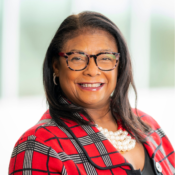
Speaker
Carola Peterson-Gaines
Community Research Associate at the UW–Madison Community-Academic Aging Research Program
Carola Peterson-Gaines is a community research associate for the Community-Academic Aging Research Network, a community liaison for Quartz Insurance, and co-chair of the African American Health Network of Dane County. She brings the force of her advocacy to work for equity in health care for some of our most vulnerable citizens — those receiving state Medicaid and Badger Care. Well-known and respected for her outstanding work during the COVID-19 pandemic and in the Madison Community-at-large, she has been exemplary in providing many health resources for marginalized people. She was a recipient of the 2021 UW–Madison Outstanding Woman of Color Award.
Speaking in
Nothing for Us Without Us: Experiences with Community-Academic Partnerships
Underserved communities are the same groups that are underrepresented in research.
Professor Eva Vivian, president of the African American Health Network and co-investigator with the UW Community-Academic Aging Research Network (CAARN), will discuss the historical trauma of Black Americans’ participation in research and how that broken trust has affected the community’s relationship to and attitudes towards future participation in research.
Only through greater inclusion of underrepresented groups in research can culturally tailored programs, practices and policy close the disparities gap. Researchers who seek to work with and in historically underrepresented communities have a responsibility to prioritize trust-building activities first and foremost.
CAARN brings together community and health system partners with academic researchers to conduct research that is of interest, need and priority to communities to improve the health of older adults and decrease health disparities. CAARN supports researchers in establishing credibility with underrepresented communities through attending community-sponsored events and demonstrating respect for, humility towards, and commitment to the community’s values and culture.
Three panelists will share their perspectives on key elements of a community-academic partnership and best practices for fostering and sustaining trust with underserved communities.
Attendees will leave with a better understanding of:
- How research has evolved in working with historically underrepresented communities
- How academics should approach underrepresented communities with research plans
- How community partnerships can direct research toward health equity and impact